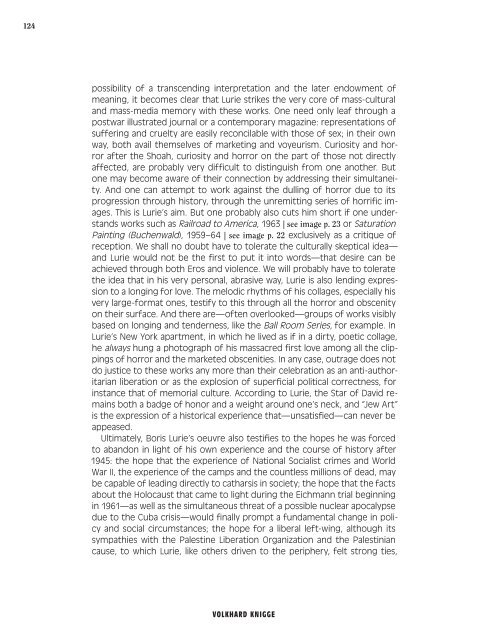The Art of
Katalog_Boris-Lurie_English
Katalog_Boris-Lurie_English
Create successful ePaper yourself
Turn your PDF publications into a flip-book with our unique Google optimized e-Paper software.
124<br />
possibility <strong>of</strong> a transcending interpretation and the later endowment <strong>of</strong><br />
meaning, it becomes clear that Lurie strikes the very core <strong>of</strong> mass-cultural<br />
and mass-media memory with these works. One need only leaf through a<br />
postwar illustrated journal or a contemporary magazine: representations <strong>of</strong><br />
suffering and cruelty are easily reconcilable with those <strong>of</strong> sex; in their own<br />
way, both avail themselves <strong>of</strong> marketing and voyeurism. Curiosity and horror<br />
after the Shoah, curiosity and horror on the part <strong>of</strong> those not directly<br />
affected, are probably very difficult to distinguish from one another. But<br />
one may become aware <strong>of</strong> their connection by addressing their simultaneity.<br />
And one can attempt to work against the dulling <strong>of</strong> horror due to its<br />
progression through history, through the unremitting series <strong>of</strong> horrific images.<br />
This is Lurie’s aim. But one probably also cuts him short if one understands<br />
works such as Railroad to America, 1963 | see image p. 23 or Saturation<br />
Painting (Buchenwald), 1959–64 | see image p. 22 exclusively as a critique <strong>of</strong><br />
reception. We shall no doubt have to tolerate the culturally skeptical idea—<br />
and Lurie would not be the first to put it into words—that desire can be<br />
achieved through both Eros and violence. We will probably have to tolerate<br />
the idea that in his very personal, abrasive way, Lurie is also lending expression<br />
to a longing for love. <strong>The</strong> melodic rhythms <strong>of</strong> his collages, especially his<br />
very large-format ones, testify to this through all the horror and obscenity<br />
on their surface. And there are—<strong>of</strong>ten overlooked—groups <strong>of</strong> works visibly<br />
based on longing and tenderness, like the Ball Room Series, for example. In<br />
Lurie’s New York apartment, in which he lived as if in a dirty, poetic collage,<br />
he always hung a photograph <strong>of</strong> his massacred first love among all the clippings<br />
<strong>of</strong> horror and the marketed obscenities. In any case, outrage does not<br />
do justice to these works any more than their celebration as an anti-authoritarian<br />
liberation or as the explosion <strong>of</strong> superficial political correctness, for<br />
instance that <strong>of</strong> memorial culture. According to Lurie, the Star <strong>of</strong> David remains<br />
both a badge <strong>of</strong> honor and a weight around one’s neck, and “Jew <strong>Art</strong>”<br />
is the expression <strong>of</strong> a historical experience that—unsatisfied—can never be<br />
appeased.<br />
Ultimately, Boris Lurie’s oeuvre also testifies to the hopes he was forced<br />
to abandon in light <strong>of</strong> his own experience and the course <strong>of</strong> history after<br />
1945: the hope that the experience <strong>of</strong> National Socialist crimes and World<br />
War II, the experience <strong>of</strong> the camps and the countless millions <strong>of</strong> dead, may<br />
be capable <strong>of</strong> leading directly to catharsis in society; the hope that the facts<br />
about the Holocaust that came to light during the Eichmann trial beginning<br />
in 1961—as well as the simultaneous threat <strong>of</strong> a possible nuclear apocalypse<br />
due to the Cuba crisis—would finally prompt a fundamental change in policy<br />
and social circumstances; the hope for a liberal left-wing, although its<br />
sympathies with the Palestine Liberation Organization and the Palestinian<br />
cause, to which Lurie, like others driven to the periphery, felt strong ties,<br />
VOLKHARD KNIGGE



